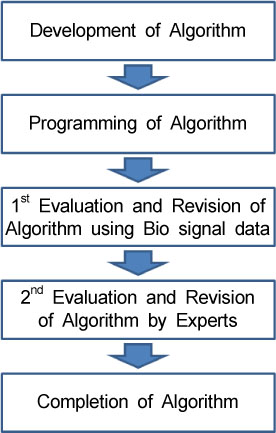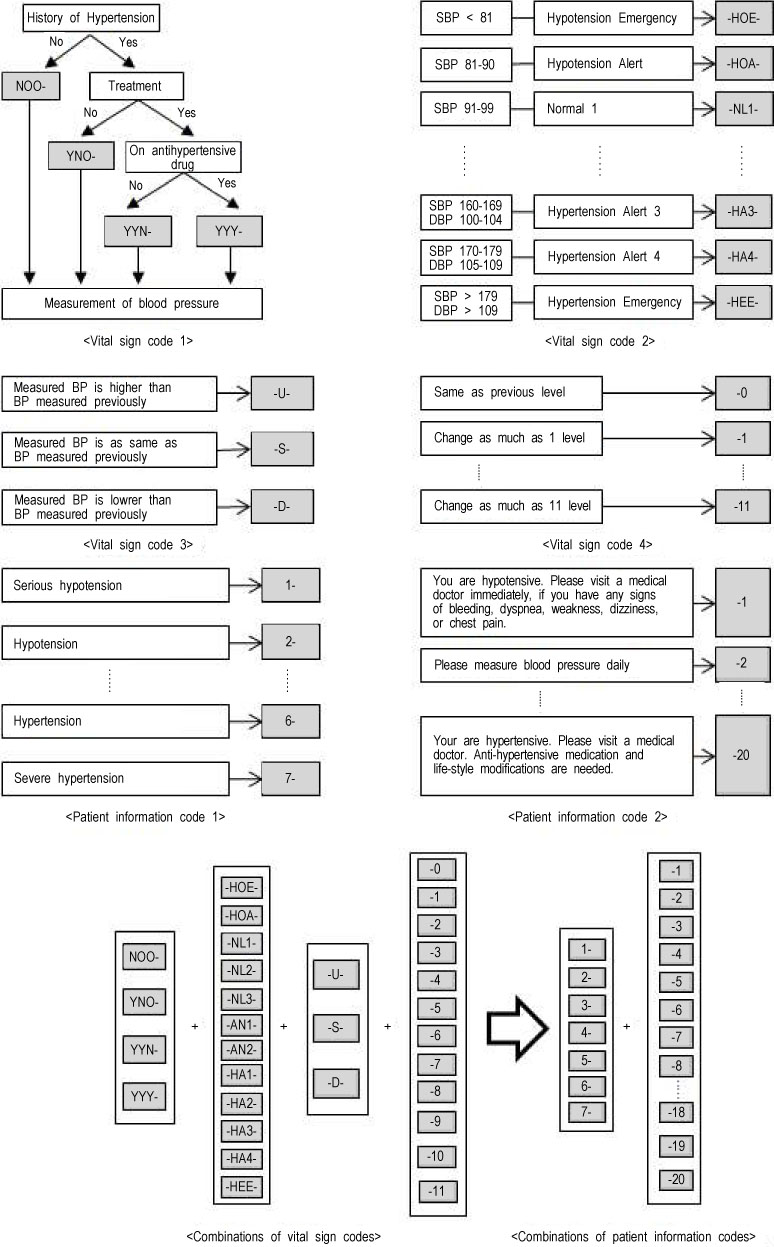J Korean Soc Med Inform.
2009 Mar;15(1):109-116.
Validation of the Algorithm for Bio-signal Data in Home-health Management Systems
- Affiliations
-
- 1Department of Nursing, Wonju College of Medicine, Yonsei University, Korea.
- 2Department of Emergeny Medicine, Wonju College of Medicine, Yonsei University, Korea. shwang@yonsei.ac.kr
- 3Department of Biomedical Engineering, College of Health Science, Yonsei University, Korea.
Abstract
OBJECTIVE
The purpose of this study was to verify the algorithm on bio-signals for a home-health management system.
METHODS
A methodological study was done to verify the blood pressure and blood sugar algorithm to deliver tailored patient information. The verifying process was as follows: Step 1; development of the algorithm through a literature review, Step 2; programming the algorithm using Microsoft SQL Server 2005 and Visual Studio 2005, Step 3; Reviewing of the algorithm by examining results from the home-health management system and experts' evaluation Step 4; evaluating the agreement of the algorithm by comparison between results from the home-health management system and intended results using bio-signal data set, and completion of the algorithm.
RESULTS
Discordance rate between results from the home-health management system and intended results for blood pressure and blood sugar were 5.72% and 2.04%, respectively. Also, discordance rate between results from the home-health management system and experts' evaluation of blood pressure and blood sugar were 30.38% and 20.41%, respectively. All discordance were revised until all the researchers reached agreement.
CONCLUSION
The home-health management system with an accurate algorithm on bio-signals can contribute to promote clients' health and reduce the cost of medical services.
Figure
Reference
-
1. Ahn BJ. Development of wireless transmission system of medical images for ubiquitous medicine [dissertation]. 2007. Gwangju: Nambu University.2. Neuhauser L, Kreps G. Rethinking communication in the E-health Era. J Health Psychol. 2003. 8(1):7–23.
Article3. Bång M, Larsson A, Eriksson H. Design requirements for ubiquitous computing environments for healthcare professionals. Medinfo. 2004. 11(2):1416–1420.4. Lyytinen K, Yoo Y. Issues and challenges in ubiquitous computing. 2002. Commun ACM. 2002. 45(12):62–96.5. Hong JH, Kim NJ, Cha EJ, Lee TS. A PDA-based wireless ECG monitoring system for u-healthcare. J Kor SocMed Informatics. 2006. 12(2):153–159.
Article6. Lee SB, An BJ, Lee SY, Lee JH. Context awareness using wireless biosignal processing. J Kor Soc Comput Informatics. 2005. 10(6):117–125.7. Accessed on December 12, 2007. Available at: http://www.pricepartnership.com/safe21/home.htm.8. Rialle V, Lamy JB, Noury N, Bajolle L. Telemonitoring of patients at home: a software agent approach. Comput Methods Programs Biomed. 2003. 72(3):257–268.
Article9. Ohta S, Nakamoto H, Shinagawa Y, Tanikawa T. A health monitoring system for elderly people living alone. J Telemed Telecare. 2002. 8(3):151–156.
Article10. Accessed on December 12, 2007. Available at: http://www.pcbee.co.kr/contents/news/na/30238.html.11. Accessed on December 12, 2007. Available at: http://www.hani.co.kr/arti/sports/sports_general/165746.html.12. Shin JH. A study on the u-healthcare system implementation for emergency rescue management of chronic patient [dissertation]. 2007. Incheon: Inha University.13. Chobanian A, Bakris G, Black H, Cushman W, Green L, Izzo J, et al. The seventh report of the joint national committee on prevention, detection, evaluation, and treatment of high blood pressure. JAMA. 2003. 289(19):2560–2572.
Article14. American Diabetes Association. Standards of medical care for patients with diabetes mellitus (position statement). Diabetes Care. 2002. 25:Suppl 1. S33–S49.15. Noe CS. Development of the selection algorithm for the diagnostic unit in CLINAID. Woosong Review. 2003. 8:1–23.16. Shin SS, Lee SB, Cho YH. Recognition of disease in medical image. J Contents Assoc. 2001. 1(1):8–14.17. Cho SH. Development of algorithm and protocol for emergency care of patient of acute chest pain : focused on acute coronary syndrome [dissertation]. 2006. Seoul: Yonsei University.
- Full Text Links
- Actions
-
Cited
- CITED
-
- Close
- Share
- Similar articles
-
- Development and Validation of Adaptable Skin Cancer Classification System Using Dynamically Expandable Representation
- Development and Validation of an Interprofessional Collaboration Scale for Home Health Care for the Frail Elderly
- Validation of the DeLone and McLean Information Systems Success Model
- Estimating need for Home Visiting Nurse from Public Health Centers
- Development of Database System for Community Based Home Care in Health Center




